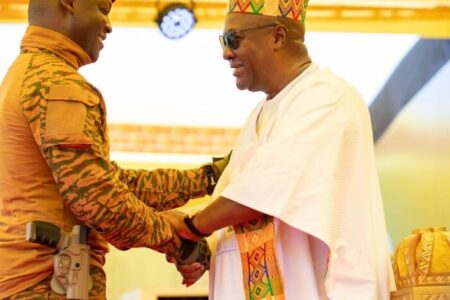In a world where diplomatic decorum and mutual respect are the cornerstones of international relations, the recent actions of Burkina Faso’s President, Ibrahim Traoré, have raised eyebrows and sparked debate. During a visit to Ghana for the swearing-in of President John Dramani Mahama, President Traoré greeted his counterpart while brandishing a firearm. This alarming display not only undermines the spirit of diplomacy but also raises significant questions about the norms of statecraft and the responsibilities of leaders on the international stage.
The role of security in international diplomacy is paramount. Typically, the responsibility for ensuring the safety of a visiting head of state falls to a combination of the host country’s security services and the visiting president’s own protective detail. As outlined by experts in international relations, such as Dr. David Cortright from the University of Notre Dame, the host country’s law enforcement agencies are tasked with crowd control, route planning, and overall safety. Meanwhile, the visiting president’s security team, akin to the Secret Service in the United States, provides close protection and coordinates with the host country’s security to ensure seamless coverage.
However, President Traoré’s decision to greet President Mahama with a firearm in hand raises serious concerns. While some may argue that this is a demonstration of strength or a cultural norm—akin to the late Palestinian leader Yasser Arafat, who was known for carrying his revolver as part of his attire—it is crucial to recognize that such actions can be interpreted as provocative and destabilizing. The symbolism of a leader wielding a weapon in a diplomatic setting cannot be overlooked. It sends a message of aggression rather than cooperation, potentially jeopardizing the fragile relationships between nations in a region already fraught with tension.
Moreover, this incident calls into question the adherence to international norms and laws regarding the conduct of leaders. The Vienna Convention on Diplomatic Relations emphasizes the importance of respect and protection for diplomats and heads of state. By flaunting a firearm during a diplomatic engagement, President Traoré not only disregards these principles but also sets a troubling precedent for future interactions among nations.
It is important to consider the broader implications of such behavior. The world is watching, and the actions of leaders can have far-reaching consequences. The normalization of aggressive displays during diplomatic visits may embolden other leaders to follow suit, eroding the foundations of diplomacy that have been painstakingly built over decades. As noted by political analyst Dr. Amadou Sy, “Diplomacy thrives on trust and mutual respect; any actions that undermine these principles can lead to increased tensions and conflict.”
In conclusion, while security is a legitimate concern for any head of state, the manner in which it is displayed matters significantly. President Traoré’s decision to greet President Mahama with a gun in hand is not merely a reflection of personal style but a troubling indication of the current state of international diplomacy. As leaders, they must strive to embody the principles of peace and cooperation, ensuring that their actions inspire confidence rather than fear. It is imperative that we hold our leaders accountable for their conduct on the world stage and advocate for a return to the core values of diplomacy that prioritize dialogue over intimidation.
Source: kofitutunews.com

